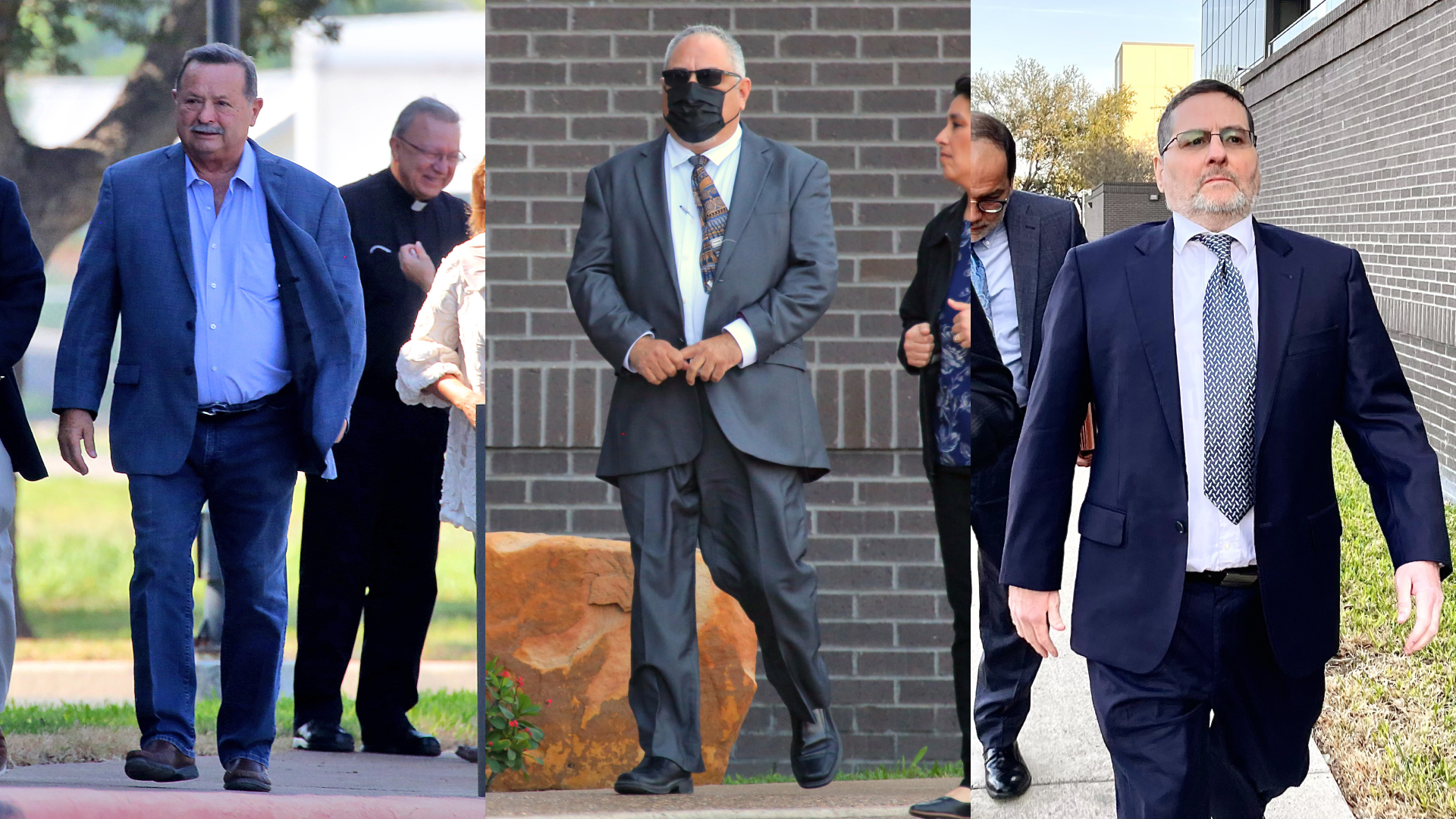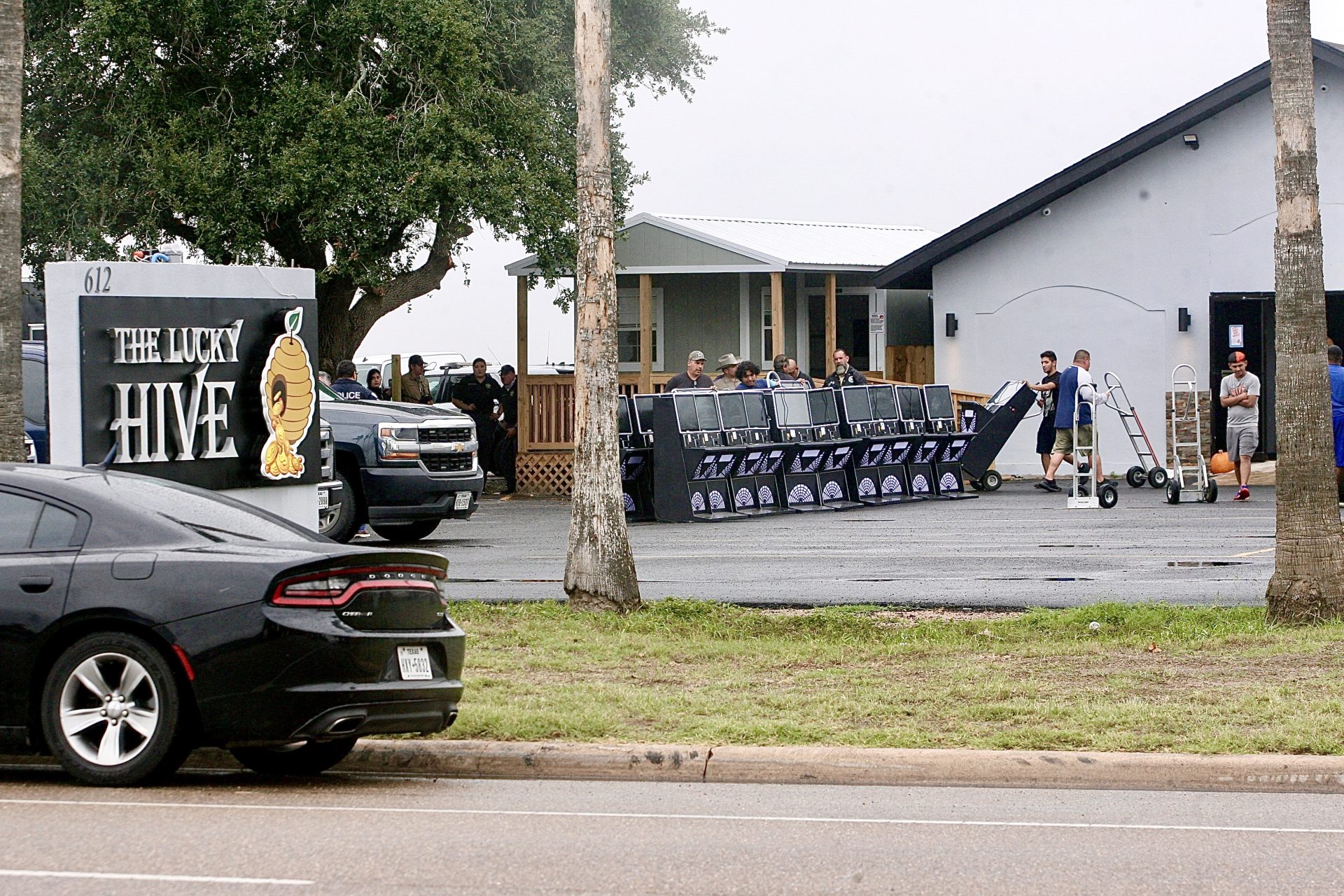|
Only have a minute? Listen instead
Getting your Trinity Audio player ready...
|
Local federal courts were quite busy during 2023.
On the criminal justice side of the bar, a number of public corruption cases saw resolutions, or at the very least, significant progress.
Meanwhile, several high profile law enforcement raids late in the year may provide a glimpse of what is to come in 2024.
But civil court proceedings were no less prolific, among them, a Rio Grande Valley-based corporation that has spent the year muddling through an expansive and expensive bankruptcy that could leave dozens of farmers broke, and a beloved restaurant chain coming under fire.
WESLACO RESOLUTION
In January, three of the men responsible for defrauding the city of Weslaco out of millions of dollars via an overpriced public infrastructure project learned their fate.
Former Hidalgo County Commissioner Arturo “A.C.” Cuellar and Weslaco businessman Ricardo Quintanilla were both sentenced to significant time for their roles in the Weslaco water plant bribery scheme that spanned at least eight years.
The two men were convicted of a combined 70 felony counts of bribery, wire fraud and money laundering after an eight-day trial in October 2022.
On Jan. 18, U.S. District Judge Micaela Alvarez sentenced Cuellar to 20 years, and Quintanilla to 16 years and eight months in federal prison.
She further ordered the two men to forfeit more than $1 million.
Alvarez sentenced a third man that day, former District 2 Weslaco City Commissioner John F. Cuellar, who is AC Cuellar’s cousin.
John Cuellar became a cooperating government witness and delivered compelling testimony against his cousin at trial.
An attorney by profession, John Cuellar detailed how AC Cuellar bribed him into voting for certain construction contractors, and disguised the illicit proceeds as payments for legal services.
AC Cuellar was sentenced to three years in federal prison.
Another cooperating witness, former District 4 Weslaco Commissioner Gerardo “Jerry” Tafolla, is slated to be sentenced early in 2024.

PUBLIC CORRUPTION
Meanwhile, additional public corruption cases evolved elsewhere in Hidalgo County.
In late March, former Mercedes city attorney Juan R. Molina pleaded guilty to stealing public money.
Molina pleaded guilty to federal programs theft. According to prosecutors, the charges stem from an unnamed business project that Mercedes and its economic development corporation were considering in 2017.
The federal criminal case against Molina parallels several civil lawsuits that the city has filed against its former legal adviser, claiming, among other things, that Molina improperly withheld funds from the city and that he defrauded the city in a series of land deals.
Molina’s sentencing date has been repeatedly pushed back, but is currently slated for late February.
Meanwhile, in April of this year, a prominent politiquero pleaded guilty to bribing public officials.
Miguel “Mike” Angel Garza admitted to paying bribes to two unnamed public officials.
Garza is best known for working as a politiquero in Edinburg.
Federal prosecutors say he bribed the two Edinburg officials to steer the city into awarding contracts to a third person, a business owner identified in court documents as “Person 1.”
Garza is slated to be sentenced at the end of January.
Another former public official learned his fate in August.
Former La Joya school board trustee Oscar “Coach” Salinas was sentenced to 14 months in federal prison for his role in a massive Western Hidalgo County public corruption scandal.
Salinas is one of a bevy of former elected or public officials who have been implicated in a scheme involving vendor contracts, bribes, kickbacks, political retaliation and more.
He pleaded guilty to one count of extortion in March 2022.
8-LINERS
In February, trial got underway against Dominga “Penny” Ledesma, a Lyford woman who had pleaded not guilty to carrying out a $21 million gambling racket in Willacy County.
Prosecutors alleged that Ledemsa used her Lyford-based business, Brittany’s Boutique, to obfuscate the heavy flow of cash running through her shop and an 8-liner gameroom next door called El Toro.
Ledesma was charged with 16 counts of aggravated identity theft, structuring financial transactions and evading federal reporting requirements.
Her one-time co-defendant, Rene Gamez Jr., who had owned El Toro, pleaded guilty a month before the trial and had agreed to testify against Ledesma.
For two days, Ledesma maintained her innocence, even as her own former employees, as well as Gamez, implicated her in the scheme, and as officials with the IRS detailed how her business had circumvented federal cash deposit reporting requirements using the identification of a dead man.
On the second day of the trial, Ledesma took the stand in her own defense, adamantly refuting the rapid-fire questions from Assistant U.S. Attorney Eric D. Flores.
Eventually, Ledesma’s attorneys called for a brief break, which the judge granted.
But the break stretched on as the jury waited in seclusion in another room.
Finally, Ledesma’s attorneys announced that their client wished to change her plea.
The trial ended with Ledesma admitting to criminal wrongdoing. She and Gamez have yet to be sentenced.

EDCOUCH AND ELSA
But that wasn’t the end for 8-liners making the news in 2023.
In October, federal agents descended upon the Edcouch and Elsa city halls as they carried out a series of raids related to 8-liners, money laundering and more.
It began when the FBI raided Edcouch City Hall on Oct. 18, where they removed several dozen records regarding the city’s finances, federally funded programs, and law enforcement activities.
At the same time, agents also paid visits to the homes of Edcouch City Manager Victor Hugo de la Cruz and Assistant City Manager Ernesto “Ernie” Rosales, even seizing Rosales’ phone.
A week later, agents with Homeland Security Investigations, or HSI, carried out a trio of raids at Elsa City Hall and two electronic game rooms — one just two blocks away, and another in eastern Edcouch.
As with Edcouch, scores of paper records were removed from Elsa City Hall. Meanwhile, investigators used a semitruck to seize dozens of electronic gaming devices from “The Lucky Hive” game room in Edcouch.
A spokesperson for HSI said that the two Delta-area investigations were not related.
SEX TRAFFICKERS SENTENCED
In December, a mother-son duo were sentenced for their years-long enterprise of sex trafficking undocumented girls and women out of a Mission sports bar.
Rita Martinez was sentenced to 30 years in federal prison, while her son, Genaro Fuentes, will spend six years in prison.
Together, the pair were convicted of extorting undocumented women and girls to repay their smuggling debts by performing sex work in a scheme that stretched from 1996 through 2019.
The pair would force the victims to perform sex work with customers of two bars owned by Martinez — Rita’s Sports Bar or Bindis — either in nearby hotels, or in trailers behind the bars.
Fuentes helped his mother carry out the scheme by keeping track of payments and performing other recordkeeping of the illicit operations.
Fuentes admitted he personally partook of the sexual coercion when he repeatedly sexually assaulted a girl between 2001 and 2005. Fuentes further admitted that he knew the girl was under 18 years old.

CIVIL LAWSUITS
On Feb. 17, Donna-based Garcia Grain Trading Corp. rocked the local agricultural community when it filed for Chapter 11 bankruptcy protection after the Texas Department of Agriculture yanked its operating licenses.
The grain storage and exporting company reported it was missing millions of dollars worth of grain from its storage elevators in Progreso.
It also maintains elevators in Edcouch, Santa Rosa and Donna. Altogether, the company initially reported that it had just over $27 million in assets, but more than $50 million in liabilities.
With four major secured creditors on the verge of calling due their debts — to the tune of more than $41 million — it appeared that the dozens of local farmers and others who had done business with Garcia Grain were going to be left high and dry.
At one point, one of the company’s largest creditors, StoneX Commodities Solutions, began to push for a Chapter 7 liquidation over concerns it wouldn’t be able to recoup any of its debts.
But, after a series of emergency hearings throughout the summer and fall, the company hired retired bankruptcy judge Richard Schmidt to serve as its chief restructuring officer.
And in recent weeks, the company has come up with a restructuring plan that would wholly change its ownership, while paying off the bulk of its secured and unsecured creditors over the course of five years.
Meanwhile, beloved Rio Grande Valley-based restaurant chain, Delia’s Tamales, is feeling the steam after two dozen former employees filed a federal lawsuit alleging age discrimination, wage theft and even threats regarding their immigration status.
The Monitor first broke the story on Oct. 20.

In their initial petition, which was originally filed in state district court before being removed to federal court, the former employees claimed that Delia’s helped them secure fake Social Security numbers, then would withhold Social Security deductions from their paychecks.
But, since the numbers were invalid, those deductions would ultimately be returned to the company, which held onto the money for itself, the former employees claim.
Once the employees approached retirement age, Delia’s would terminate them to avoid paying retirement benefits, the workers claimed.
They further claimed that the company coerced them into silence by threatening to report them to immigration officials.
However, those more salacious allegations were absent from an amended complaint filed in federal court earlier this month.
The two sides are not slated to meet again in court until well into 2024.





